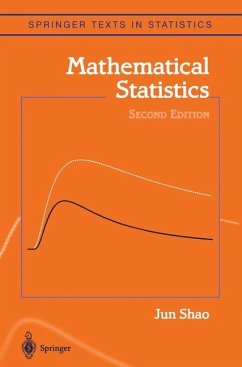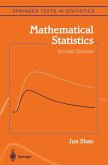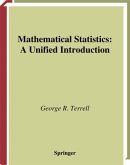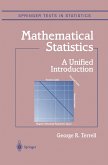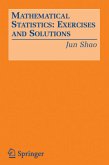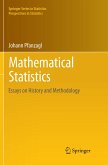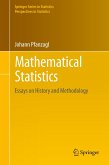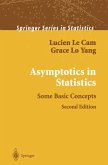This graduate textbook covers topics in statistical theory essential for graduate students preparing for work on a Ph.D. degree in statistics. The first chapter provides a quick overview of concepts and results in measure-theoretic probability theory that are useful in statistics. The second chapter introduces some fundamental concepts in statistical decision theory and inference. Chapters 3-7 contain detailed studies on some important topics: unbiased estimation, parametric estimation, nonparametric estimation, hypothesis testing, and confidence sets. A large number of exercises in each chapter provide not only practice problems for students, but also many additional results.
In addition to improving the presentation, the new edition makes Chapter 1 a self-contained chapter for probability theory with emphasis in statistics. Added topics include useful moment inequalities, more discussions of moment generating and characteristic functions, conditional independence, Markov chains, martingales, Edgeworth and Cornish-Fisher expansions, and proofs to many key theorems such as the dominated convergence theorem, monotone convergence theorem, uniqueness theorem, continuity theorem, law of large numbers, and central limit theorem. A new section in Chapter 5 introduces semiparametric models, and a number of new exercises were added to each chapter.
In addition to improving the presentation, the new edition makes Chapter 1 a self-contained chapter for probability theory with emphasis in statistics. Added topics include useful moment inequalities, more discussions of moment generating and characteristic functions, conditional independence, Markov chains, martingales, Edgeworth and Cornish-Fisher expansions, and proofs to many key theorems such as the dominated convergence theorem, monotone convergence theorem, uniqueness theorem, continuity theorem, law of large numbers, and central limit theorem. A new section in Chapter 5 introduces semiparametric models, and a number of new exercises were added to each chapter.
From the reviews of the second edition:
"The second edition of Mathematical Statistics continues to hold its identity among many other available books on mathematical statistics...The revised and updated version remains of high quality, and I recommend it for use as a text or reference book in a graduate statistics program." Journal of the American Statistical Association, September 2004
"The first edition of this book was published in 1999 ... . The main changes include addition of new material in Chapter 1, addition and deletion of a number of exercises, addition of two new sub-sections ... . The book remains valuable to instructors and graduate students of traditional mathematical statistics courses, specially for its large collection of problems and for its rigourous presentation." (Arup Bose, Sankhya: The Indian Journal of Statistics, Vol. 65 (3), 2003)
"This book is intended for an advanced postgraduate course in Mathematical Statistics, offeredin a mathematically rigorous fashion. ... in order to get to grips with rigorous mathematical statistics, this is an ideal book. Also, as a reference book, it is ideally suited. ... Two particularly attractive features of the book are the large number of exercises at the end of each chapter - well over a hundred in each chapter, and the fact that asymptotic theory is studied throughout the book ... ." (Tertius de Wet, SASJ - South African Statistical Journal, March, 2004)
"The second edition of Mathematical Statistics continues to hold its identity among many other available books on mathematical statistics...The revised and updated version remains of high quality, and I recommend it for use as a text or reference book in a graduate statistics program." Journal of the American Statistical Association, September 2004
"The first edition of this book was published in 1999 ... . The main changes include addition of new material in Chapter 1, addition and deletion of a number of exercises, addition of two new sub-sections ... . The book remains valuable to instructors and graduate students of traditional mathematical statistics courses, specially for its large collection of problems and for its rigourous presentation." (Arup Bose, Sankhya: The Indian Journal of Statistics, Vol. 65 (3), 2003)
"This book is intended for an advanced postgraduate course in Mathematical Statistics, offeredin a mathematically rigorous fashion. ... in order to get to grips with rigorous mathematical statistics, this is an ideal book. Also, as a reference book, it is ideally suited. ... Two particularly attractive features of the book are the large number of exercises at the end of each chapter - well over a hundred in each chapter, and the fact that asymptotic theory is studied throughout the book ... ." (Tertius de Wet, SASJ - South African Statistical Journal, March, 2004)

